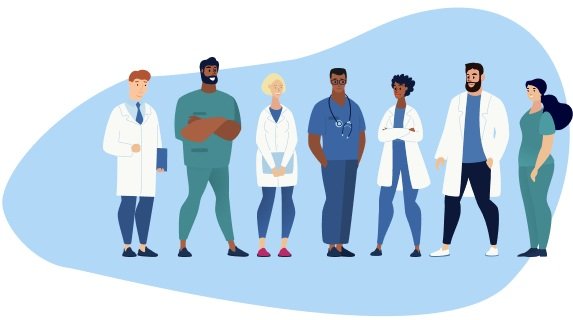
fellowship timeline
Interested in Fellowship?
Applying for fellowships can be a stressful process, but this page will include important information if you are currently applying or if you are considering fellowship. It’s important to start the process early!
PGY-1
It’s never too early to start thinking about if you want to pursue a fellowship. In the beginning, you should focus on settling in and figuring out what works for you. As you start to get comfortable, start taking interest in some research projects and meeting with your advisor/mentor.
explore possibilities for fellowship, by the end of PGY-1 you should identify what you want to apply for.
What are you passionate about? Do you enjoy performing procedures? Do you have a faculty/role model you can talk to?
Do you enjoy the role of consultant, or do you find satisfaction being a generalist?
Post-residency does not just come down to hospitalist, fellowship, vs. primary care.
Talk to alumni, 3rd years, faculty, attendings!
pgy-2
Start looking for projects you want to work on, subspecialty electives
end of PGY-1 into PGY-2, get involved with research, find prospective mentors and research projects, talk to the faculty of the subspecialty and fellows
submit research projects/case reports to conferences/try to publish!! (ACP, CHEST, SGIM, SHM, etc)
January-May of PGY-2
Update CV
start personal statement
Notify Associate Program director and program director that you are applying
pgy-3
You’re so close!
Important sites:
ERAS Fellowships Documents office (https://www.erasfellowshipdocuments.org)
MyERAS
NRMP
Mid May to June
Approach APD/PD/Faculty for LOR, arrange for in person (letters are due July 15th, ask in advance!)
Complete personal statement and CV
Review prospective fellowship programs
Prepare for Interviews (do mock interviews!)
Rank and wait for MATCH day!
THE Unofficial checklist to improve chances of fellowship match
1)Be a great internist – study all of the specialties, be reliable, and complete all assignments and clerical documents (logs, evaluations, reflections, etc). Be a role model of professionalism, teamwork, and medical knowledge. Be the person that others like to go to for help.
2)Prioritize patient care, even over your own needs.
3)Make sure to schedule a time with the PD to state your interest in the specialty and if applicable, your interest in the particular program.
4)Seek out and maintain a relationship with faculty in your chosen specialty. Get yourself on their speed-dial and come through when they ask for things. MAKE SURE THEY KNOW YOUR NAME. WHERE YOU ID BADGE PROMENENTLY. SIGN YOUR NAME WHEN YOU TEXT OR MESSAGE THEM. INTRODUCE YOURSELF MORE THAN ONCE.
5)Express an interest in what your specialty mentor does. Be able to discuss it knowledgably.
6)At the same time – demonstrate a passion for your chosen specialty – Get involved in research projects that are being done in that division – DO NOT VOLUNTEER TO ASSIST WITH RESEARCH AND THEN NOT SHOW UP TO DO THAT!!
7)If participating in a research project do more than just data entry. Do the background literature review (UTILIZE OUR GREAT LIBRARIANS TO DO THIS – DO NOT JUST DO IT YOURSELF). Look at the data you are collecting and ask probing questions (are there variables that look like they might separate the data beyond the ones which your team has thought (eg: what if you compared young to old, men vs women, people with substance use vs not, people that are one ethic vs another, people who are sedentary vs active, etc).
8)If you do not know how to ask probing questions pick up a book called “Studying a Study and Testing a Test”. This is a simple book that describes the clinical research process and it’s a fairly quick read.
9)Steer your scholarly efforts to your chosen specialty (Resident Grand Rounds, QI Projects, Morning Reports, Etc)
10)Take at least one elective in your chosen specialty and bust your ass to make an impression. Do not schedule competing obligations (Step 3, Wellness days, etc) during that elective time.
11)Take an elective outside Lenox Hill. Make yourself known to them. Bust your ass to make an impression. Taking outside electives can be a bit tricky. We have to justify them educationally. Try to find something they do there that we do not do here (transplants, other procedures, certain kinds of research). Start these arrangement WELL IN ADVANCE. It can take up to 6 months to complete the paper work to make an outside elective possible.
12)If your application is weak (low step 2 scores, not a US medical school, not a chief resident) consider taking a year to do a related independent clinical fellowship (hepatology, nutrition for GI; heart failure, cardiac imaging, preventive cardiology for Cardiology; etc).
13)There are also Chief Resident positions in outside programs every year.
14)Do not write a lot of abstracts and posters but no full length manuscripts. Don’t give the appearance that you start a lot of projects but not finish any.
15)Don’t put anything on you CV that you can’t discuss intelligently. Everything on there is fair game. If you are asked what role you played be prepared to discuss it.
16)Apply broadly. Geographic limitations are a direct course to not matching.
17)Ask for help. Find out what you need to do to be a more attractive candidate. Do the things that are suggested.
18)If you are not getting many interviews, ask someone to reach out on your behalf to get more.
19)Interviews at Northwell programs are a given. I you only have interviews at Northwell program, then you do not have enough interviews. Reach out to us to reach out to others.
20)Ask for people to reach out on your behalf a week or two before the rank order list deadline.
21)Try to find unique programs to apply to that is different than other local applicants. When the program promotes residents, it is most effective if we promote only one resident per given fellowship program since programs rarely take two candidates from the same external institution.
before Eras opens…
letters of recommendation
Start thinking of who to ask for letters of recommendation (ask the letter writer 2-3 months before ERAS opens)
For Dr. Fried, in addition to your CV/personal statement, please prepare a “hero” story, describing a patient scenario, where you are the hero! Be as descriptive as possible!
organize your cV
General tips:
Emphasize strengths
Be clear, concise, accurate, <2 pages
Organized, start keeping track starting PGY-1
Heading, Education, Honors/Awards, Research/publications/presentations, Work, Extracurricular, Professional memberships, personal interests
Give it to someone for feedback
Revise!!
write your personal statement
Start working on your personal statement, format is similar to residency personal statement.
Why do you want to go into this field, what have you done in the field, highlight strengths (why will you be an excellent fellow). Be sure to have perfect grammar and spelling. Have people read it and have feedback. The personal statement is your opportunity to communicate you career goals and highlight your talents and experiences.
important dates
june 2024
Get an ERAS token from EFDO.
Register with MyERAS and Begin working on your application !!!
Submit your ERAS fellowships token request, tokens will be sent via email at the time you request your token
EFDO (ERAS fellowship documents office) will release tokens to fellowship applicants. This service stores and sends any related supporting documents for your application
MSPE (Medical student performance evaluation)
Medical school transcript
Letters of recommendation
Photographs
Post-grade training authorization letters (for International medical grads)
July cycle fellowship applicants may begin submitting applications to programs.
ERAS opens for July application cycle fellowship programs. The MyERAS application and supporting documents are made available to programs you have designated.
july 2024
july- september
Start hearing from programs and scheduling interviews!
aug-nov
Interviews!
Make a calendar, plan in advance with respect to schedule!
Notify chiefs, find coverage!
Register with the NRMP (allows you to register for the Match),
Ranking opens, submit rank list!
Rank Order List due! Certify well in advance of this deadline. Website may be slow and prone to crash!
MATCH DAY!!!!!
august 2024
sept 2024
nov 2024
NOV-DEC





